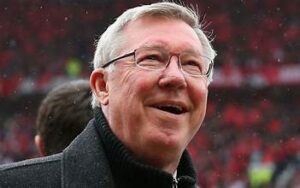Alex Ferguson Family History
Overview

Alex Chapman Ferguson was born on December 31st, 1941 to Alexander and Lizzie Ferguson in the Govan district of Glasgow. His father was a plater’s helper in the shipbuilding industry. He grew up in a tenement on Govan Road and attended local schools.
The shipyards dominated his growing up. But football provided a way out for him. With his father’s encouragement he began playing at a local youth club before signing a part-time contract with the Scottish football club St. Johnstone in 1960. He was then also working part-time as an apprentice at a Govan shipyard. He met his wife Cathy in Glasgow in 1964 when they were working together in a typewriter factory.
Football! Alex became a full-time professional footballer with Dunfermline in 1964. In 1966 he transferred from Dunfermline to the Glasgow club Rangers for the then Scottish record fee of £65,000. However, his stay at Rangers, a Protestant club, was only to last four years. He believed he ended up being discrimated against because his wife Cathy was a Catholic.
His footballing career ended with Falkirk in 1974 and he moved into management, first with St. Mirren and then with Aberdeen. At Aberdeen he achieved success by winning the Scottish League and Cup and the European Cupwinners Cup in his eight years there.
Manchester United. An even greater success came at Manchester United, whom he joined in 1986 and was to remain in charge until 2013. During that period he won 38 trophies, including 13 Premier League titles, five FA Cups and two UEFA Champions League titles. He is considered by many to have been Britain’s greatest ever football manager.
Shipbuilding along the Clyde
Renton. These Fergusons were to be found in the 19th century in the small town of Renton on the Leven river in West Dunbartonshire. Robert Ferguson was born in 1830. He died young of typhoid in Renton in 1864. There were two sons, John and Robert, with his partner Ann Scullion and another child (apparently) with Mary Nielsen as she claimed child support from him.
Robert’s son Robert was recorded as settled in Renton in 1880 with a partner and baby son and working at a boatyard as a riveter. But he died in the poorhouse of tuberculosis at the age of forty-one in 1896, as had his partner Catherine of the same disease two years earlier.
John and his four siblings, having lost their parents at a young age, were raised by relatives as Catholic. But John’s wife Janet came from a Protestant family. She insisted that their son Alexander, who was born just two months after their marriage in 1912, should be brought up as Protestant.
John like his father was a riveter at Renton. He fought in the First World War but was invalided out of it after being gassed He was taken to a hospital in Glasgow and the family moved there to be closer to him. He died in 1923, the third of his family in a row to die young (typhoid, TB, and now being gassed).
Belfast and Glasgow. After his death his widow Janet married a man named Johnny Miller and the family moved to Belfast.
Her son Alexander Beaton Ferguson left school at fourteen in 1926 to work at the Harland & Wolff shipyard in Belfast. He returned to Glasgow in the 1940’s – to marry and raise a family – and to work at the Govan yards.

Govan and its shipyards were to leave a lasting impression on his son Alex. On Alex’s desk at Manchester United was a plaque with the simple words: “I come from Govan.”
He has said:
“The great thing about Govan was its pride. It was full of life and vitality springing from the shipyards. My father worked in the shipyards, my brother worked in the shipyards, my uncles worked in the shipyards. Everything revolved around the shipyards.”
It was this working-class grit and connectedness that Sir Alex brought to his football management career.
Renton’s Footballing Heritage
Sir Alex may have got his football intelligence from Renton. This place was one of the eleven founding members of the Scottish Football League. The club, founded in 1872, were winners of the Scottish Cup in 1885 and 1888. Indeed in the latter year they went on to defeat the English cupholders West Bromwich Albion by a score of 4-1 in terrible weather before a crowd of 6,000 in Glasgow.
The players were ahead of their time in training for stamina and strength. Their secret weapon was Renton’s own famous “chicken bree.” The ingredients were never disclosed but were probably port wine swished with a couple of eggs and administered daily. However, there were no Fergusons among their list of players.
Alex Ferguson’s Family Tree
- Robert Ferguson (1830-1864) from Renton, Dunbartonshire m. Ann Scullion (1827-1894)
- – John Ferguson (b. 1853)
- – Robert Ferguson (1854-1896)
- Robert Ferguson from Renton, Dunbartonshire m. Catherine Mulhollan (1860-1894)
- – John Ferguson (1880-1923)
- – Mary Ferguson (b. 1883)
- – Catherine Ferguson (b. 1887)
- – George Ferguson (b. 1889)
- – Patrick Ferguson (b. 1891)
- John Ferguson from Dunbartonshire m. Janet (Jenny) Beaton (b. 1891) in 1912. She later remarried Johnny Miller and moved to Belfast
- – Alexander Ferguson (1912-1979)
- – John Ferguson (b. 1913)
- Alexander Beaton Ferguson from Dunbartonshire m. Elizabeth (Lizzie) Hardie from Belfast (1922-1986) in Glasgow in 1941
- – Alex Ferguson (b. 1941)
- – Martin Ferguson (b. 1942)
- Sir Alex Ferguson from Govan m. Cathy Holding (1948-2023) in Glasgow in 1966
- – Mark Ferguson (b. 1968)
- – Darren and Jason Ferguson (b. 1972)
Click here for return to front page

